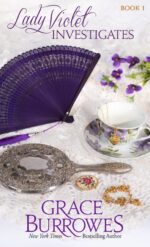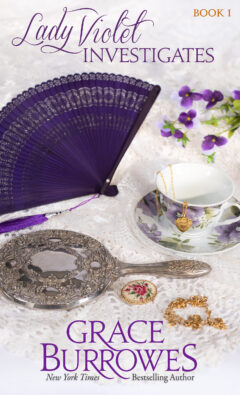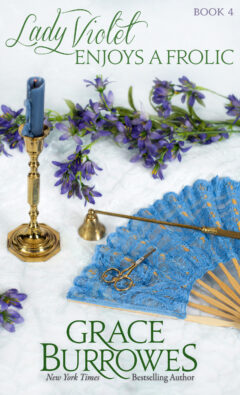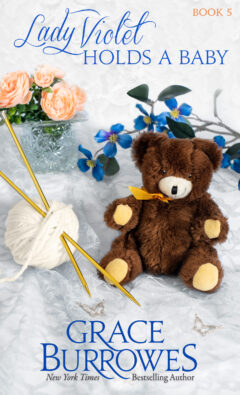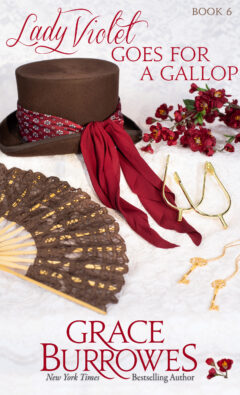Lady Violet Investigates — Book One
Lady Violet Mysteries Book 1
Book 1 in the Lady Violet Mysteries series
Lady Violet Belmaine emerges from two years of mourning less than enthusiastic about resuming her place in Polite Society. She’s talked into attending a country house party by her French physician friend, Hugh St. Sevier, only to find that the house party guests are preyed upon by a mysterious thief.
Among the guests is Sebastian MacHeath, Marquess of Dunkeld. Violet once considered Sebastian her closest confidant, but war and the passing years have changed him. Nonetheless, when Sebastian’s valet, another veteran, comes under suspicion, Violet, St. Sevier, and Sebastian must work together to discover the true culprit, lest an innocent man be sent to the gallows for crimes he did not commit.
Enjoy An Excerpt







Chapter One
Two mortal afflictions befell me the night of the Robertson’s ball. The first arrived as a pounding agony spreading from my nape around to the left side of my skull. The megrim would be gone in a day or two—sooner if the fates were kind.
The second undeserved penance stood before me in the person of Sebastian MacHeath, his arctic blue eyes full of disdain I’d done nothing to earn.
“Sir.” I offered him a curtsey.
“Lady Violet.” His bow mocked even as it sketched exquisite grace on a grand scale. “What the hell are you doing here?”
He still had the burr, the one that been nearly unintelligible when he’d first been sent down from Scotland at the age of ten. His accent was a soft growl now, but to my ear, discernible. The better to vex him, I took him by the arm.
“I’m socializing,” I said, “a quaint custom among the higher primates. What has induced you to inflict your person upon polite society?”
“I’d heard you were in mourning.” No emotion colored that observation, not gloating, and certainly not concern. Once upon a youthful time, Sebastian had been kind and generous. That endearing fellow had apparently died at some point during Wellington’s Peninsular campaign.
For me to regret his passing was folly, though I did. The growling officer he’d become was entirely devoid of charm.
“I put off second mourning months ago,” I said. “Shall we discuss the weather or glare daggers at one another to liven up this otherwise genteel event? Lady Robertson would doubtless prefer the latter.”
We were making a circuit of the ballroom, a tedious exercise intended to show off a lady’s finery and her partner. My escort could not help but turn heads. Sebastian met every criterion for a young maid’s most fanciful dreams: Tall, sable-haired, broodingly attractive with heavy brows, an angular jaw, and an incongruous dimple on the left cheek. Broad shoulders narrowed to lean flanks, and his features included a wide mouth and an aquiline nose just shy of hooked.
If he ever smiled, which evidence of humanity I had not seen for years, he’d be gorgeous. In his present perpetual glower, he would frighten every unmarried woman in the room straight back to her chaperone’s side.
“How did Belmaine die?” Sebastian asked.
“I did not poison my husband.” In my worst, most wounded moments, I’d wanted to, but those moments had passed as the marriage had become a functional alliance. My late spouse had been the apple of my eye when we’d plighted our troth, but then, a seventeen year old’s eyes are easily deceived. After a year of marriage, I’d realized that Frederick Belmaine’s real fondness had been for my settlements, and for the fact that I was the first female born to the Earls of Derwent for nearly eighty years.
“Belmaine was too young to die of an apoplexy,” Sebastian said, “and too healthy to succumb to a heart seizure.”
“Also too unlucky to avoid bad fish.” That Sebastian was ignorant of the details told me he’d only recently returned to London, which raised the question: Why was he here? Not that I cared. Curiosity, however, had ever been my besetting sin.
“I heard he died in a questionable location.”
A brothel, but let it be noted, Frederick had expired at an exclusive brothel in exclusive—expensive—company. I had paid Madam’s bills myself after the funeral and taken care of other pressing obligations resulting from Frederick’s demise as well.
“Why does it not surprise me,” I said, “that you’d bring up such a sordid detail in the very middle of a Mayfair ballroom?”
“You do not deny the rumor.”
Nor could I deny that some stupid, callow part of me wished that Sebastian had never gone to war, wished that the tolerant young man with the charming burr had married some sweet young lady, and was now the father of more charming young fellows, one of whom I might call my godson.
“Why would I bother confirming or denying such twaddle? How is your sister?”
He ignored that question, steering me deftly into an alcove lit by a single sconce. As a widow, I had the freedom of alcoves and closed carriages, provided I was discreet.
“Clementine is up to four weans, all of them loud, opinionated, and impertinent, much like their mother.”
He fell silent, his gaze not searching so much as accusing, though I knew not of what. To his family’s horror, Sebastian had stormed off to buy a military commission when all loyal Brits with the blunt to do so had been similarly engaged. More than once, I’d wondered why.
If men had simply stayed home when the call to arms had sounded, half of Europe would not be in ruins, and half the lower orders reeling from wounds and widowhood. Of course, my strategy required that the Frenchmen stay home as well, and in that regard, the Corsican had failed to oblige me.
“Are you well, Violet?” Sebastian snapped off the question like a salute before battle.
“I am quite well.” Though what battle were we about to join? “And you?”
“Thriving.”
“On a diet of anger and vexation, apparently.” War could do that to a man. I respected Sebastian enough not to deliver more than a glancing poke to the hornet’s nest of his temper.
One dark brow swooped aloft. “You think I’m angry?”
“Vexed about something. You were never very good at hiding your emotions.” I’d treasured that about him. Sebastian had been an honest, open-hearted fellow. English public schools had muted his inherent good cheer to a philosophical humor, but even headmaster’s fondness for the birch rod did not explain the taciturn warrior pacing the alcove like a caged jungle cat.
He came to a halt before a floor-to-ceiling window that looked out on the torchlit terrace. In the shadows of the single scone, Sebastian might have been a demon liberated from the Pit for some nefarious purpose.
“I am attending the house party at Bathvale.” He said this quietly, more of an admission than an announcement. “Uncle passed away last year. I am to take my place in society or Clemmie and the aunties will do me a grievous injury.”
He’d inherited a marquessate, then. The Scottish peerage was of lesser import than the English peerage, but still, I had not heard of this development. The obscurity of widowhood suited me, though lately, I’d also suffered a curious restlessness even amid the endless glories of my conservatory and greenhouse.
“Sebastian, I am sorry for your loss.” He’d hated his uncle, whose lofty station and lack of sons had dictated Sebastian’s remove to England as a boy.
“Not half as sorry as I am.” A hint of Scottish self-mockery laced his words, a ghost of the old Sebastian.
“A quarter of polite society will attend the Bathvale gathering.” Myself included. Widows were ever so handy when a chaperone needed a little privacy for her own diversions, or a hostess wanted extra eyes and ears among the mamas.
“I did not want to ambush you,” Sebastian said.
He faced the garden, suggesting that perhaps—possibly?—he had not wanted to be ambushed by a reunion with me amid the gossips assembled at the typical house party.
The shock of seeing him had been considerable. I ignored the pounding at my temples and searched his words for any meaning beyond the superficial. We were not enemies that I knew of, to waylay one another. Once upon a time, we’d been friends.
Good friends, with the heedless, trusting intimacy of the young.
Then his earlier admission swam past the unanswered questions that thoughts of Sebastian always provoked: I am to take my place in society.
“You will begin your search for a marchioness.” That hurt, not because this was Sebastian, confidant of my girlhood, splendid soldier, and wealthy aristocrat, but because courting rituals would always have the power to wound me, even if I was indifferent to the parties involved.
Which I was in this case, or nearly so.
He glanced at me over one muscular shoulder. “One marries when afflicted with a marquessate.”
For another man, that word choice—afflicted—would have been ridiculous, but for Sebastian, who’d loved nothing better than roaming the fields, reading poetry in a tree house, or sinking a line in the brook only to throw back everything he caught, the title was a dreaded sentence come to pass.
“I will wish you the joy of your campaign,” I said, trying to mean it. “I expect you will achieve your objective long before the house party’s closing festivities.” Perhaps the right wife could banish the shadow that had fallen over Sebastian’s soul in adulthood.
I was neither equal to nor interested in that honor.
Sebastian studied me, which required that I meet his gaze without flinching. I’d always loved his eyes, so blue, so bold. Windows not only to his soul, but to his heritage as a highland laird taking his place in a long and courageous succession.
“You have a headache,” he said. “What the hell are you doing at this farce when a megrim is upon you? You’ll only make it worse, and then you’ll be laid low for three days. Violet, you know better.”
Of all people, Sebastian alone had the power to discern, simply by looking at me, when my head pained me. He’d always had this ability, claiming my eyes gave away my suffering. My eyes had never given away my suffering to my husband, my parents, or my dear brothers.
Only to Sebastian.
“The headaches pass,” I said.
He stepped closer. “And then they return. You are an idiot to bring needless suffering upon yourself for the sake of a few waltzes.”
“I am.” But how could I convey to him, a familiar who’d become a stranger, the subtle threat that another quiet evening among my orchids presented? The yawning abyss of ennui that the retiring widow was supposed to fashion into something pleasant and meaningful?
I had no wish to remarry—none—but lately, even my conservatory was losing its charms.
“So go home,” he said, his hand settling on my nape. His grip was warm—he’d always had warm hands—and firm. He squeezed with an exquisitely calibrated pressure that brought blessed relief of my pain. I’d tried fashioning a clamp to emulate the sensation of Sebastian’s grip on my neck, to no avail.
His touch was a forgotten balm, a small miracle that reminded me of life beyond the seemingly endless purgatory of a nascent megrim. My thinking mind knew the pain would pass, but my body believed the suffering.
“I’ll send for your coach,” Sebastian said, gently circling a thumb at the join of my neck and shoulder. “Whatever possessed you to attempt this gathering when you know the pain will only worsen is beyond mortal comprehension. Do you want to end up in Bedlam?”
I stepped away. “Your solicitude is appreciated, but I have promised the supper waltz to Dr. St. Sevier.” We’d spend the set talking botany, as agreeable a use for a waltz as any.
“Who is this St. Sevier?”
None of your business. I might have flung that inelegant retort at Sebastian’s scowling face, except that a scream—high pitched, prolonged, terrified—rang out across the ballroom. The violins straggled to a halt as the screaming went on, and the murmur of a hundred conversations fell silent.
“That’s coming from the gallery,” I said, trying to push around Sebastian, who’d planted himself in the alcove’s doorway like an inconveniently positioned sculpture.
The screaming ceased, leaving a shocked stillness in its place.
“Stay here,” he muttered. “Better still, have your coach brought around and get the hell home.”
He strode off, every inch the officer wading into battle, and I, no longer one to heed any man’s orders, followed immediately in his wake.
End of Excerpt
Lady Violet Investigates — Book One is available in the following formats:

Grace Burrowes Publishing
February 22, 2022
- Grace’s BookstoreThis is Grace’s
independent
ebook store.
Your purchase can be added to any device. - Barnes & Noble Nook
- Kobo
- Apple Books
- Amazon Kindle
eBook:
Other eBook Purchase Options:
- Kobo UK
- Booktopia AUS
- Amazon UK
- Amazon Kindle UK
United Kingdom:

- Bookshop
- Apple Books
- Libro.fm
- Audible
- Amazon Audio
- AudiobooksNow
- Books-A-Million
- BingeBooks
- Chirp
- Hoopla
- Kobo
- Nook Audiobooks
Audio:
For those who patronize public libraries, this title has also been uploaded to Overdrive, Hoopla, Baker & Taylor, and many other library channels. You can see the full list of library distributors here.
Listen to a Snippet:
Connected Books
Lady Violet Investigates — Book One is Book 1 in the Lady Violet Mysteries series. The full series reading order is as follows:
- Book 1: Lady Violet Investigates — Book One
- Book 2: Lady Violet Attends a Wedding — Book Two
- Book 3: Lady Violet Finds a Bridegroom — Book Three
- Book 4: Lady Violet Enjoys a Frolic — Book Four
- Book 5: Lady Violet Holds a Baby — Book Five
- Book 6: Lady Violet Goes for a Gallop — Book Six
- Book 7: Lady Violet Pays a Call — Book Seven
- Book 8: Lady Violet Says I Do













